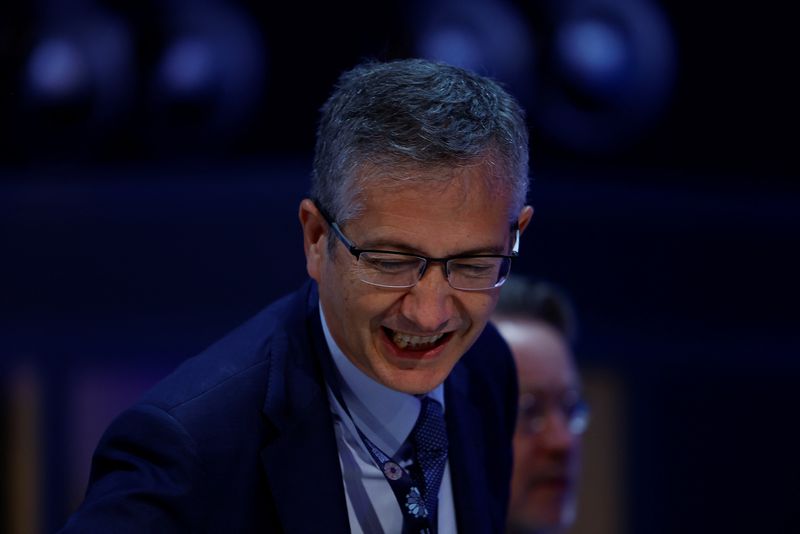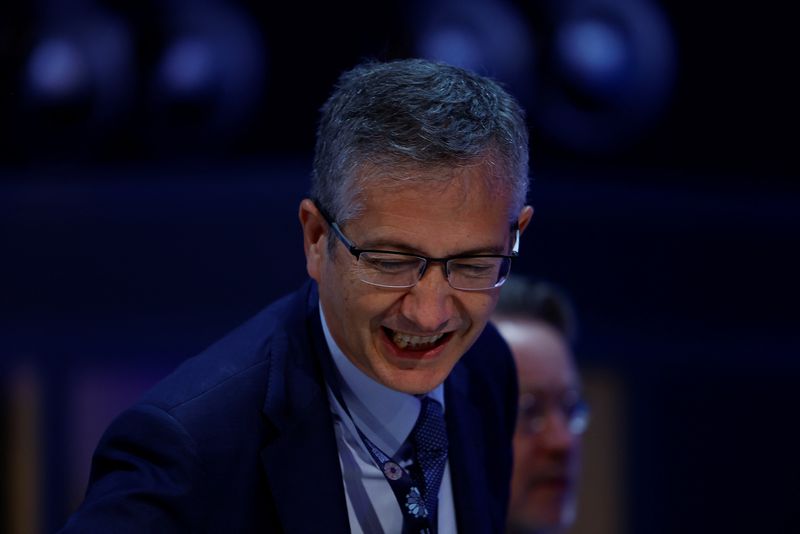Economy
Bank of Spain Governor sees no need to extend mortgage support


© Reuters. FILE PHOTO: Bank of Spain Governor Pablo Hernandez de Cos attends the start of the International Monetary Finance Committee (IMFC) Plenary during the annual meeting of the International Monetary Fund and the World Bank, following last month’s deadly earth
MADRID (Reuters) – Bank of Spain Governor Pablo Hernandez de Cos on Monday said he did not see the need at the moment for banks to potentially extend mortgage relief measures for vulnerable households given the limited use from citizens so far.
Last week, Spain’s Prime Minister Pedro Sanchez said the new coalition government was planning to extend the annual income threshold to qualify for mortgage relief support to 38,000 euros ($41,283) as part of a set of measures to help families cope with higher borrowing costs.
“In this central scenario in which the economy is still slowing down but could recover again in 2024, we see no need to amend the code of good practice,” De Cos said at a financial event held in Madrid.
Under an amended industry-wide code of good practice, Spain’s banks are now expected to provide mortgage support for vulnerable families earning less than 25,200 euros per year.
Additionally, middle-class families with an income of less than 29,400 euros and who were at risk of defaulting would also receive additional protection.
Around three-quarters of the Spanish population are homeowners. They are among the most exposed to a rise in interest rates, as around 70% of their more than 4 million outstanding mortgage loans are bearing variable rates.
The average cost of a mortgage in Spain has risen to 3.84% as of August, compared to 2.03% in the same month in 2022.
In November 2022, the Spanish government approved mortgage relief support for more than one million vulnerable households, but so far only 42,000 requests have been made in the first seven months of 2023, according to data from the Bank of Spain.
“We have observed that the use is still limited, our assessment of this fact is that the economy has been going reasonably well. We have all been surprised by the strength of the labour market,” De Cos said.
Economy
Russian central bank says it needs months to make sure CPI falling before rate cuts -RBC


© Reuters. Russian Central Bank Governor Elvira Nabiullina attends a news conference in Moscow, Russia June 14, 2019. REUTERS/Shamil Zhumatov/File Photo
MOSCOW (Reuters) – Russia’s central bank will need two to three months to make sure that inflation is steadily declining before taking any decision on interest rate cuts, the bank’s governor Elvira Nabiullina told RBC media on Sunday.
The central bank raised its key interest rate by 100 basis points to 16% earlier in December, hiking for the fifth consecutive meeting in response to stubborn inflation, and suggested that its tightening cycle was nearly over.
Nabiullina said it was not yet clear when exactly the regulator would start cutting rates, however.
“We really need to make sure that inflation is steadily decreasing, that these are not one-off factors that can affect the rate of price growth in a particular month,” she said.
Nabiullina said the bank was taking into account a wide range of indicators but primarily those that “characterize the stability of inflation”.
“This will take two or three months or more – it depends on how much the wide range of indicators that characterize sustainable inflation declines,” she said.
The bank will next convene to set its benchmark rate on Feb. 16.
The governor also said the bank should have started monetary policy tightening earlier than in July, when it embarked on the rate-hiking cycle.
Economy
China identifies second set of projects in $140 billion spending plan


© Reuters. FILE PHOTO: Workers walk past an under-construction area with completed office towers in the background, in Shenzhen’s Qianhai new district, Guangdong province, China August 25, 2023. REUTERS/David Kirton/File Photo
SHANGHAI (Reuters) – China’s top planning body said on Saturday it had identified a second batch of public investment projects, including flood control and disaster relief programmes, under a bond issuance and investment plan announced in October to boost the economy.
With the latest tranche, China has now earmarked more than 800 billion yuan of its 1 trillion yuan ($140 billion) in additional government bond issuance in the fourth quarter, as it focuses on fiscal steps to shore up the flagging economy.
The National Development and Reform Commission (NDRC) said in a statement on Saturday it had identified 9,600 projects with planned investment of more than 560 billion yuan.
China’s economy, the world’s second largest, is struggling to regain its footing post-COVID-19 as policymakers grapple with tepid consumer demand, weak exports, falling foreign investment and a deepening real estate crisis.
The 1 trillion yuan in additional bond issuance will widen China’s 2023 budget deficit ratio to around 3.8 percent from 3 percent, the state-run Xinhua news agency has said.
“Construction of the projects will improve China’s flood control system, emergency response mechanism and disaster relief capabilities, and better protect people’s lives and property, so it is very significant,” the NDRC said.
The agency said it will coordinate with other government bodies to make sure that funds are allocated speedily for investment and that high standards of quality are maintained in project construction.
($1 = 7.1315 renminbi)
Economy
Russian central bank says it needs months to make sure CPI falling before rate cuts -RBC


© Reuters. Russian Central Bank Governor Elvira Nabiullina attends a news conference in Moscow, Russia June 14, 2019. REUTERS/Shamil Zhumatov/File Photo
MOSCOW (Reuters) – Russia’s central bank will need two to three months to make sure that inflation is steadily declining before taking any decision on interest rate cuts, the bank’s governor Elvira Nabiullina told RBC media on Sunday.
The central bank raised its key interest rate by 100 basis points to 16% earlier in December, hiking for the fifth consecutive meeting in response to stubborn inflation, and suggested that its tightening cycle was nearly over.
Nabiullina said it was not yet clear when exactly the regulator would start cutting rates, however.
“We really need to make sure that inflation is steadily decreasing, that these are not one-off factors that can affect the rate of price growth in a particular month,” she said.
Nabiullina said the bank was taking into account a wide range of indicators but primarily those that “characterize the stability of inflation”.
“This will take two or three months or more – it depends on how much the wide range of indicators that characterize sustainable inflation declines,” she said.
The bank will next convene to set its benchmark rate on Feb. 16.
The governor also said the bank should have started monetary policy tightening earlier than in July, when it embarked on the rate-hiking cycle.

 Forex2 years ago
Forex2 years agoForex Today: the dollar is gaining strength amid gloomy sentiment at the start of the Fed’s week

 Forex2 years ago
Forex2 years agoHow is the Australian dollar doing today?

 Forex1 year ago
Forex1 year agoUnbiased review of Pocket Option broker

 Forex2 years ago
Forex2 years agoDollar to pound sterling exchange rate today: Pound plummeted to its lowest since 1985

 Cryptocurrency2 years ago
Cryptocurrency2 years agoWhat happened in the crypto market – current events today

 World2 years ago
World2 years agoWhy are modern video games an art form?

 Stock Markets2 years ago
Stock Markets2 years agoMorgan Stanley: bear market rally to continue

 Economy2 years ago
Economy2 years agoCrude oil tankers double in price due to EU anti-Russian sanctions

































